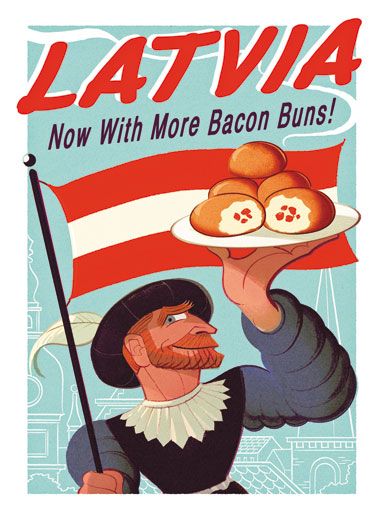Strike Up the Brand
In an ever more competitive world, nations strive for the perfect slogan
/https://tf-cmsv2-smithsonianmag-media.s3.amazonaws.com/filer/Last-Page-Latvia-slogan-631.jpg)
You know the sense of decorum and probity that marketing consultants have brought to our political campaigns? Now they’re doing the same thing for whole countries. It’s called “nation branding,” a new, improved way to jostle for attention in the global marketplace. A key part of the mission is to sum up a nation in a single dazzling phrase. “Malaysia, Truly Asia,” for instance, or “Chile, All Ways Surprising.” South Korea briefly touted itself as “Dynamic Korea.” Officials later switched to “Korea, Sparkling,” but had second thoughts when someone pointed out that it sounded like a fizzy drink. “Miraculous Korea” was briefly contemplated as a replacement, but finally everyone settled on “Korea, Be Inspired.” (“Korea, So Good We Made Two” was never a serious contender.)
Branding a nation clearly poses many challenges. The tendency of some countries to have a lunatic for dear leader is not, however, one of them; consultants are used to that from the corporate world. But a lot of countries don’t have much of an identity, as far as the outside world is concerned. They proliferate like brands of soap, with only so much sparkle to go around.
You have to sympathize with the authors of an academic article headlined “Development of a national branding strategy: The case of Latvia.” But let’s brainstorm here. The official Latvia travel webpage boasts that “In Latvia, there is every opportunity to receive high-level medical services.” (And, OK, six Unesco World Heritage sites in an area smaller than South Carolina.) But if the idea is to dazzle tourists, investors, international agencies and the media, “Mad Men’s” Don Draper would tell us to reach into their souls: “Latvia...Home of the Bacon Bun.”
No doubt nation branding involves hours of patient explaining to baffled government officials why traditional ideas about identity don’t matter much, compared with what the world wants. For instance, the Caribbean nation of Trinidad and Tobago’s motto is “Together we aspire, together we achieve.” But how about “Rum Punch on the Beach,” instead? Likewise, the motto of the British Virgin Islands is “Vigilante” (Be watchful). But since BVI has built itself into a financial haven by not watching, maybe the nation brand could be something peppier, like “Fabulous Tax Schemes.”
The best nation brands catch on and generate buzz. But they can also have a nasty way of biting back. When Ireland’s “Celtic Tiger” recently went on life support from the European Union, for instance, it led inevitably to headlines about being declawed, defanged and “Too Old to Pounce.” Nor did Britain do all that well by the 1990s brand “Cool Britannia.” It used to seem just like a lame Austin Powersy attempt to cash in on the Fab 1960s. Then it took on a chilly new meaning this past winter, when the entire nation fell into a deep freeze.
With some countries, as with some political candidates, the best strategy may be to manage expectations—for instance, “China: Now 55 Percent Less Communist!” Or “Amazingly Asian Myanmar: Not Just for Jailed Dissidents!” Sweden has such a reputation for fabulously beautiful people that underselling might take some of the pressure off average-looking Swedes. What about “Eat Stinky Fish, Watch Disturbing Movies”?
The consultants themselves often seem a little vague about what they’re selling. Even brands they consider genius can look remarkably interchangeable. If it’s Tuesday, this must be “Amazing Thailand.” Or is it South Africa “Alive With Possibility”? Did we just touch down in “Positively Transforming” Estonia? Or is it “Iceland Naturally”?
Feeling confused? Ultimately, a wishful traveler might yearn for Bolivia—or anyplace, really—where “The authentic still exists.”
Richard Conniff wrote about Luddites in the March issue.
/https://tf-cmsv2-smithsonianmag-media.s3.amazonaws.com/accounts/headshot/richard-conniff-240.jpg)

/https://tf-cmsv2-smithsonianmag-media.s3.amazonaws.com/accounts/headshot/richard-conniff-240.jpg)